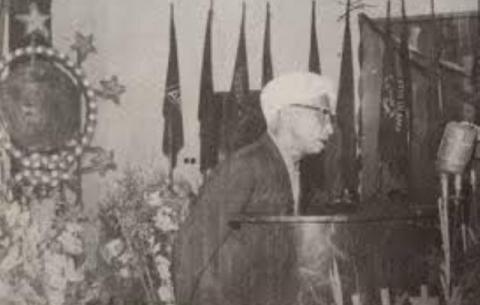KH Wahab Chasbullah's statement of Waliyyul Amri Dharuri Bissyaukah
Sen, 17 September 2018 | 06:29 WIB
As part of the largest Islamic entity in the country, Nahdlatul Ulama (NU) did not simply agree with Kartosoewirjo's wishes because the concept of a nation-state based on Indonesian pluralism did not restrict Muslims from carrying out their beliefs and worships.
From the beginning, the NU ulema stated that the movement carried out by Kartosoewirjo with his Indonesian Islamic State was a bughot (rebellion) which had to be eradicated for the sake of the continuity of the national unity because of diversity.
On this stand, the Minister of Religious Affairs KH Masjkur initiated an Indonesian Alim Ulema conference held in Cipanas, Cianjur on March 2-7, 1954 to confirm the position of the head of state of the Republic of Indonesia as the so-called Waliyul Amri Dharuri Bissyaukah.
KH Abdul Wahab Chasbullah (1888-1971) as a cleric attending the conference explained at length about Waliyul Amri Dharuri Bissyaukah in the parliamentary session on March 29, 1954. (Choirul Anam, Pertumbuhan dan Perkembangan NU, 2010)
Referring to the book of fiqh, Kiai Wahab explained that the Islamic world had agreed to appoint Imam A'dham (Those who has the right to occupy the position of Imamat), one imam (leader). One of the requirements is that the leader must have religious knowledge that is equal to the Absolute Mujtahid. And this is considerably called the legitimate imam, not the Emergency Imam.
But those who have Islamic knowledge and are condered the same as "Mujtahid mutlak" since 700 years ago have until now never existed. This means that the appointment of Imam A'dham is impossible to succeed.
But that does not mean there are no other alternatives. If Muslims are no longer able to appoint Imam A'dham, then it is obligatory for Muslims in each country to appoint the Imam who is 'emergency'. All imam (leaders) were appointed due to the emergency are called Imam Dharuri.
Furthermore, Kiai Wahab added that both imam a'dham and imam dharuri could be considered legitimate as holders of state power, namely waliyul amri. Soekarno who at that time was chosen by the prominent national figures even not by all, according to Islamic law was legitimate as the Head of State, even though there were not enough conditions to be a waliyyul amri.
Because it is not sufficient conditions for not being chosen by the competent ulema (ahlul halli wal aqdi) but through another process, then his position must be included in the so-called 'dharuri'. While the term 'bissyaukah' is because the only strongest person in Indonesia was Ir. Soekarno.
Even though it is included in the 'dharuri', his power must still be effective and in full power. On this stand, he was authorized to appoint religious officials through delegation of authority to the minister of religious affairs. For example, the appointment of the head of a religious court as so-called wali hakim in cases of absence of the so-called wali nasab for women in marriage.
Then assigning the head of state as the wali hakim is in an emergency to obtain the marriage ratification from the Islamic jurisprudence point of view. (Fathoni/Masdar)
Terpopuler
1
Hasil Sidang Sengketa Pilpres 2024: Seluruh Permohonan Anies-Muhaimin Ditolak MK
2
Ini Profil Delapan Hakim MK yang Putuskan Sengketa Pilpres 2024
3
Apa Itu Dissenting Opinion dan Siapa Saja Hakim yang Pernah Melakukannya?
4
Sidang Putusan MK, Berikut Petitum Anies-Muhaimin dan Ganjar-Mahfud
5
Lolos Perempat Final Piala Asia U-23, Lawan Berat Menanti Timnas Indonesia
6
Terkait Hasil Pemilu, PBNU Serukan Patuhi Putusan Mahkamah Konstitusi
Terkini
Lihat Semua



